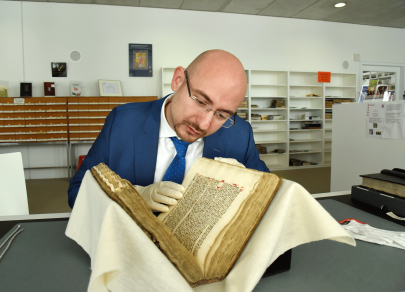Dr. Michele Campopiano
My field of research is fascinating. The best way to explain it to non-specialists is…
This project will analyse the management of water resources in the Po and Rhine River areas, focusing in particular on the period between the consolidation of urban autonomies and local authorities and the rise of dynastic states from the end of the 13th to the mid-16th centuries. Notwithstanding the availability of copious amounts of studies about climate, demographics and extreme nature events, very little has been done to illuminate the socio-political dimension of water management. My project focuses on four specific cases: Cologne and Strasbourg in the Rhine area as well as Turin and Reggio Emilia in the Po Valley. Apart from their geographic situations, these areas show both similarities and differences in terms of their institutional contexts and economic use of the respective waterways.
What research questions are you currently working on?
Historians, including and especially in Germany, have recently become extremely interested in the ways in which people have managed the natural environment in the past. However, more research is required into the management of water infrastructures, particularly in terms of its socio-economic dimension. In the course of this project, I shall be able to further develop the combination of economic and political history as the basis for an in-depth investigation of the history of the environment. It also enables me to study the intellectual categories through which the elites understood the economic exploitation of their environment. My project will help us understand relationships between people and environment in conjunction with political structures and the economy, and also how our scientific paradigms influence our interactions with the environment.
My most important success in research to date is…
I have already researched water infrastructures in Italy, Iraq and the Netherlands. My research has shown how water infrastructures oriented on short-term profits have increased the risk of drought and flood events and have, in this way, facilitated the desertification of Iraq. I have demonstrated how changes in the commercial exploitation of the environment have made rural communities vulnerable to extreme natural events.
Will the results of your research have a concrete impact on our everyday lives either now or at some later date?
The project will take a comparative and interdisciplinary approach that has the potential to provide a better understanding of the relationship between mankind and the environment and to show how this influences the vulnerability of communities to extreme natural events such as flooding and drought. It will also help us understand which institutional organisations are required to increase the resilience of communities.
What reputation does German research enjoy in your home country?
German research has a very good reputation in Italy. When I was a student at the Scuola Normale Superiore in Pisa, I was immediately urged to learn German and to spend some time studying in Germany. The combination of an excellent basic education and the stimulation of theoretical debates make Germany an extremely important centre for international research.
Questionnaire for the host
Guest of: Prof. Dr. Gerrit Jasper Schenk
Department: History and Social Scienes
What would you say you appreciate most about your guest or what made the most favourable impression on you…
I have been following Dr. Campopiano’s career for some years now and am extremely impressed by the quality and breadth of his research (not only in the field of hydraulic engineering), his language skills, his methodical, reflective approach and the comparative perspective (also in terms of economic and political history) he applies to his research into hydraulic engineering infrastructure north and south of the Alps.
He is making an innovative contribution to the development of new fields of research, such as environmental history, through the combination of research approaches and results from various disciplines and national traditions. He raises productive questions and I am certain that he will find answers that will advance the science (not only in Darmstadt).
You, your team and the TU Darmstadt benefit from …
Much research is already being conducted into infrastructures both within my own subject area and at the Critical Infrastructure Research Training Group (Kritis). We will all benefit from the opportunity to provide Dr. Campopiano with constructive support with his research and deliberations and to critically discuss his research questions and findings. Importantly, his inclusion will also mean a broadening of our horizons through his contacts to Italy, England, France and Belgium that are particularly welcome.







